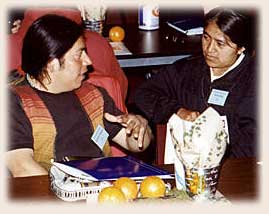|
SOIL, FOOD, &
PEOPLE CONFERENCE
March 27-29, 2000
GROW BIOINTENSIVE conference on the U.C. Davis campus
Home
| Intro | Presentations
| Breakout Sessions
| Friends: Old & New | Sponsors
BREAKOUT SESSIONS
 On
Wednesday morning everyone broke into small groups to brainstorm
and develop recommendations for GROW BIOINTENSIVE policy and action
that might be considered. These were the reports that were brought
back to the group as a whole. The recommendations made included: On
Wednesday morning everyone broke into small groups to brainstorm
and develop recommendations for GROW BIOINTENSIVE policy and action
that might be considered. These were the reports that were brought
back to the group as a whole. The recommendations made included:
Agricultural Policy
- Paying the true value of resources used. Disincentives
for inappropriate use of natural resources.
- Subsidies for converting to GROW BIOINTENSIVE.
- Labeling of products that are produced sustainably.
- Incentives to use locally produced food.
Genetic Diversity
- Heritage seeds preserve biodiversity. They
are valuable because most of them come from before the time we
used chemicals and so can be cultivated without using chemicals.
Heritage seed clubs are needed to increase biodiversity. They
would work for the collection and maintenance of seed production
for individuals and seed companies. They should get government
seed bank varieties to the public, strengthen CSA's, train gardeners
and multiply seeds.
- Crop breeding clubs working with horizontal
(poly gene) resistance can produce new varieties with increased
resistance to pests and diseases and thus reduce pesticide use.
Networking
- Include more information in the Ecology Action
website www.GrowBiointensive.org.
- Sponsor nationwide GROW BIOINTENSIVE field
days around the country.
- Develop a teachers' manual for grades K-12.
- Sponsor a national conference every 2-3 years
and an international one every 5 years.
- Think of creative ways to generate funding
for the GROW BIOINTENSIVE projects.
Nutrition
- Buy from local growers.
- Use regional, multi-cultural and traditional
diets.
- Get kids involved. Have school gardens everywhere.
- Link gardens with cooking instruction.
- Create relationships between schools and local
farms.
Research
- Research the major challenges of integrated
systems, including water supply and urban and animal waste.
- Research/demonstration sites should be established
at more locations.
- Find simple "tools" that can be used
by everyone to assess how they are doing in the area of sustainability.
Training, Education and Demonstration
- Describe the key learning steps and phases
of GROW BIOINTENSIVE techniques and relate Ecology Action publications
to them.
- Continue to define target groups and outreach
opportunities.
- Search for people in communities who are the
most receptive to applying GROW BIOINTENSIVE practices, including
young people and elders.
- Encourage the creation of demonstration gardens
with easy public access and visibility, to demonstrate the method
at various stages of development
|